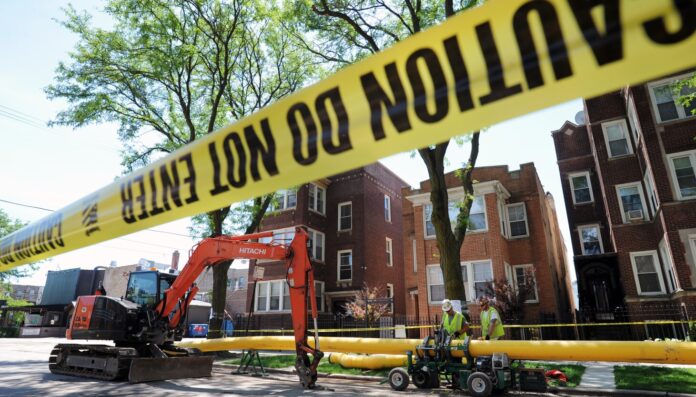Peoples Gas should resume work on its chronically over-budget pipeline replacement program and pump another $7.2 billion into completing the perpetually delayed effort within a decade, a pair of state administrative law judges have concluded.
That was the recommendation sent to the Illinois Commerce Commission on Tuesday as officials mull the future of hundreds of miles of aging underground pipes delivering natural gas to Chicago homes.
The commission halted the utility’s long-maligned Safety Modernization Program last year pending an investigation into why citywide upgrades budgeted at about $2 billion in 2007 have already cost ratepayers $3.3 billion — with only 38% of the work done.
Consumer advocates have long derided the program as a wasteful corporate cash grab that will continue to jack up heating bills for a system that could grow obsolete as the state phases out fossil fuel energy sources.
But leaders of Peoples Gas and organized labor have pushed to get back to the trenches to make critical safety upgrades on a network in which some pipes are over a hundred years old — a network delivering energy that’s still more affordable than the electric alternative, they argue.
Administrative law judges Jessica Cardoni and Matthew Locke mostly sided with the utility in their 227-page proposed order, which they wrote provides “a balanced and cost-effective approach to addressing both immediate safety needs and future system improvements.”
The judges are urging commissioners to let Peoples Gas spend about $7.2 billion to complete the program by 2035, ahead of the 2040 target set by the utility. They also called for Peoples Gas to file an updated replacement plan within two years.
The five-member Commerce Commission, which has the final say on how much utilities can charge customers, will rule on the program’s fate in January.
Past iterations of the commission have largely followed recommendations from the agency’s administrative law judges, but the current panel — all members appointed by Gov. JB Pritzker — has shown a willingness to go tougher on utilities than agency staffers have suggested.
In shutting down the pipeline program last fall, commissioners slashed Peoples’ requested rate hike from a recommended $350 million to about $300 million — still a record-high jump that has tacked an additional $6 to the average monthly residential bill this year.
Pritzker wants to wean the state off fossil fuels in favor of renewable sources by 2050, as outlined under the Climate and Equitable Jobs Act he signed in 2021.
Peoples Gas president Bill Mastoris called the judges’ latest recommendations “consistent with what the ICC’s own expert staff, a world-renowned engineering firm, and our own construction crews have been seeing for years.”
“It is critical for safety, and for the reliability of Chicago’s heating system, that this very old system be modernized,” Mastoris said in a statement.
James Sweeney, president and business manager for International Union of Operating Engineers Local 150, urged commissioners to follow the recommendations.
“The only project that should be halted is [the commission’s] singular focus on moving everything to the electric grid,” he said in a statement. “It’s an idea that is dead in the water due to skyrocketing prices for electricity, the massive energy demand for data centers and so much more.”
Sweeney’s union has been one of the loudest critics of the commission and also helped defeat Chicago Mayor Brandon Johnson’s proposed ordinance that would have ended natural gas hookups for new construction.
Sarah Moskowitz, executive director of the Citizens Utility Board, warned that the proposed order “would give Peoples Gas a license to inflict staggering rate hikes on more than 800,000 Chicago households.”
A study released by her consumer watchdog group found the average Chicago heating bill could double over the next 15 years if regulators don’t make Peoples Gas overhaul the pipeline program.
The proposed order “would permit the utility to practice business as usual on a program with a glaring decade-long record of financial excess and gross inefficiency that has cost consumers a fortune,” Moskowitz said in a statement. “Business as usual is simply unaffordable.”
Abe Scarr, director of the Illinois Public Interest Research Group, said the recommendation “throws more of our money at the problem,” but was optimistic about commissioners taking a different tack.
“The commission rightly saw the need for reform when it paused the program and ordered an investigation,” Scarr said in a statement. “I’m confident the final outcome in this case will include meaningful reforms, leading to a program that costs less, makes us safer, and facilitates the transition to clean energy.”
Contributing: Brett Chase
